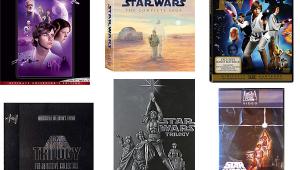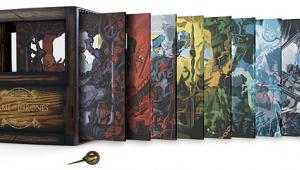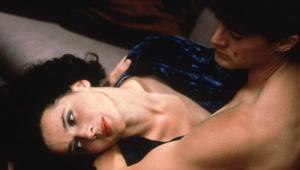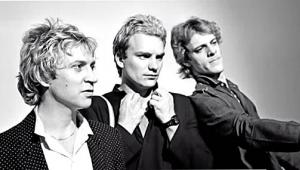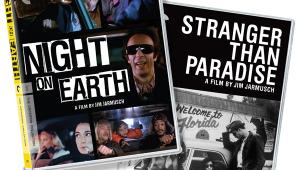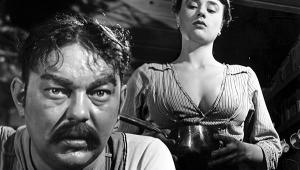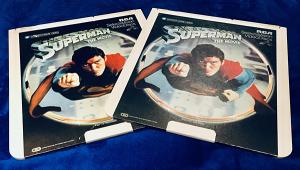DVD Review: Robinson Crusoe on Mars

| The Criterion Collection Movie •••• Picture •••• Sound ••• Extras •••• |
When it comes to science-fiction movies of the early 1960s, Robinson Crusoe on Mars was "a conglomeration of all the crap that had ever been made." Or so it might have been if the original script had been used, and if the writer of that screenplay had become the film's director, as originally intended. But thankfully, Ib Melchior's script was reworked by John Higgins. And the director's chair for this 1964 movie went not to Melchior but to Byron Haskin, who had already helmed sci-fi classics like The War of the Worlds (1953).
Those dismissive words about the original treatment were spoken by Haskin himself in a 1979 audio interview (5 years before his death), which was included in the commentary for the Criterion Collection's 1994 laserdisc of Robinson Crusoe. Happily, that commentary and nearly all of the other laserdisc extras reappear, along with a few fresh bonuses, in Criterion's long, long-awaited DVD debut of the film.
But first, back to our movie. After all, this is Robinson Crusoe . . . on Mars. And no one can blame the uninitiated for assuming the worst from that "comic-strip title," as it's referred to by Haskin - who, along with others working on the film, tried to get the title changed but was vetoed by the studio. However, that didn't stop Haskin from bringing aboard Higgins and resolving to make a scientific purse out of a man-eating fish's ear, to cite one of the more ridiculous creations in Melchior's original script. Indeed, it was apparently filled with creatures - and if you want to get some idea of what Robinson Crusoe by Melchior would have resembled, just check out a movie that he not only wrote but did direct, the American International monsterfest called The Angry Red Planet (1960).
Faced with Melchior's script, Haskin told Higgins: "Let's try to put some dignity in it." Haskin believed that the key for a successful sci-fi movie was "to get as close to scientific fact as you possibly can." Accordingly, staying true to the themes of Daniel Defoe's 1719 novel, Haskin and Higgins marooned their astronaut on a barren world (shot not on the floor of Death Valley but up in its ridges) and left him to find shelter, water, and food (not to mention breathable air), with only a NASA monkey for companionship - until the arrival of Friday, in the form of a very human-looking alien slave.
The result, as Michael Lennick points out in his fine new booklet essay, "scores most highly for its verisimilitude." And that's what struck me when I first saw Robinson Crusoe on Mars in 1964, at age 8. Sure, I admit I had seen and sorta dug The Angry Red Planet - but this was the real deal, and far more interesting to a boy wrapped up in the early days of the Space Race. Unfortunately, the film failed at the box office initially, due primarily to problems with distribution. But it would get a second life at Saturday matinees, where I got to know it intimately after repeated viewings. That said, as star Paul Mantee emphasizes in the commentary, the film shouldn't be considered a kids' movie. In fact, notwithstanding the blasts of alien mining ships, Robinson Crusoe on Mars is as lucid, serious, and adult as Cast Away, and it has even prompted scholarly essays (see the Bright Lights Film Journal piece by Walter Rankin). Not only that, among the movies directed by Haskin, it was his favorite.
But the initiated who never had the laserdisc will no doubt be exclaiming, "Mantee is on the commentary?!" Indeed he is, which is a relief after booklet writer Lennick's many secondhand references to "Mantee has said" and "Mantee has revealed" and "Mantee has spoken at length." Even though Mantee shares the track with the Haskin audio clips as well as with other actual commentators, he does indeed speak at length about the film itself, the production, his acting challenges, and his "little scene-stealer," Mona the Woolly Monkey (actually played by a male, Barney). Also joining in are Victor Lundin (Friday), production designer Al Nozaki, and historian Robert Skotak.
Melchior is here, too, and he remembers being "surprised" and "saddened" upon learning that his original vision was being altered. His recalled regret is palpable - and so is his bitterness, as he points out some holes in Higgins and Haskin's verisimilitude (such as a burning Mars in one scene vs. an oxygen-starved fire-making attempt in another). Of course, these holes have never bothered the faithful, nor have the borrowed mining ships (from The War of the Worlds). On the contrary, all of that is preferable to what Melchior would've given us, such as aliens with three-fingered, suction-cupped hands and, instead of the marvelous Mona, an extraterrestrial armadillo.
- Log in or register to post comments


